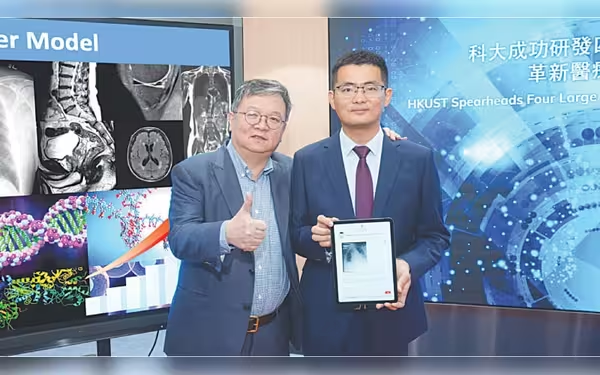Thursday, November 7, 2024 05:48 AM
HKUST Unveils Medical ChatGPT to Revolutionize Cancer Diagnosis
- AI tool reduces cancer diagnosis time by 40%.
- MOME model achieves over 90% accuracy in breast cancer detection.
- HKUST collaborates with hospitals for reliable AI healthcare solutions.
 Image Credits: dawn
Image Credits: dawnHKUST introduces Medical ChatGPT, an AI tool that reduces cancer diagnosis time by 40%, enhancing efficiency and patient outcomes.
The rapid advancement of artificial intelligence (AI) is transforming various sectors, and healthcare is no exception. Recently, the Hong Kong University of Science and Technology (HKUST) unveiled four innovative AI medical models, including a groundbreaking tool referred to as "medical ChatGPT." This technology is designed to assist healthcare professionals in diagnosing up to 30 different types of cancers and other diseases, with the potential to reduce diagnosis time by an impressive 40 percent.
During a media briefing, Chen Hao, an assistant professor in the Department of Computer Science at HKUST, introduced MedDr, a versatile AI medical generalist. This tool operates similarly to a "medical GPT," allowing users to submit close-up images for analysis. MedDr can generate reports and provide initial diagnoses, offering treatment recommendations through a chatbot interface. Chen expressed optimism that this model could save doctors between 30 to 40 percent of their time, thereby enhancing their efficiency and enabling them to focus on more critical tasks.
To ensure the accuracy and reliability of this AI tool, HKUST plans to collaborate with local hospitals and consult with medical professionals. According to the university, MedDr stands out as one of the largest open-source software developments in general medicine. A recent study conducted by the Shanghai AI Laboratory has recognized it as one of the best existing generalist models available.
Another noteworthy AI model developed by HKUST is MOME, which specifically targets breast cancer, one of the most prevalent cancers among women in Hong Kong. This model aids doctors in analyzing breast MRIs, enabling them to quickly differentiate between benign and malignant tumors. By doing so, MOME can potentially prevent unnecessary pathological biopsies. Furthermore, this model can predict how patients will respond to chemotherapy, assisting in the creation of tailored treatment plans.
Chen highlighted that the accuracy of the MOME model can rival that of radiologists with five or more years of experience, achieving an impressive accuracy rate exceeding 90 percent. This remarkable achievement was made possible through partnerships with five hospitals in mainland China and the analysis of over 10,000 patient cases.
In addition to MedDr and MOME, HKUST has developed two other models, mSTAR and XAIM, which serve as pathology assistant tools. These tools help to clarify how AI medical systems make decisions, further enhancing the transparency and trustworthiness of AI in healthcare.
Guo Yike, the provost of HKUST, emphasized that this initiative marks a significant step toward modernizing healthcare. He mentioned that the university is actively working towards establishing Hong Kong's third medical school, with a strong focus on integrating AI into modern healthcare practices.
As we stand on the brink of a new era in medical technology, the implications of these advancements are profound. The integration of AI tools like MedDr and MOME not only promises to streamline the diagnostic process but also holds the potential to improve patient outcomes significantly. As healthcare continues to evolve, it is crucial for medical professionals to embrace these innovations, ensuring that they are equipped to provide the best possible care in an increasingly complex medical landscape.













